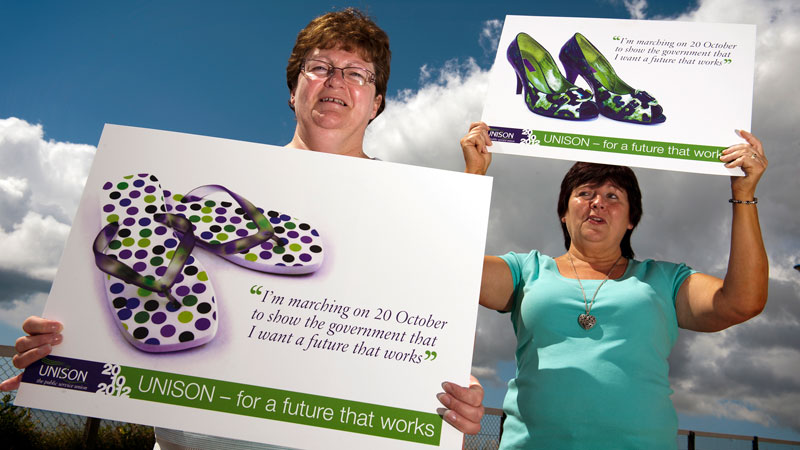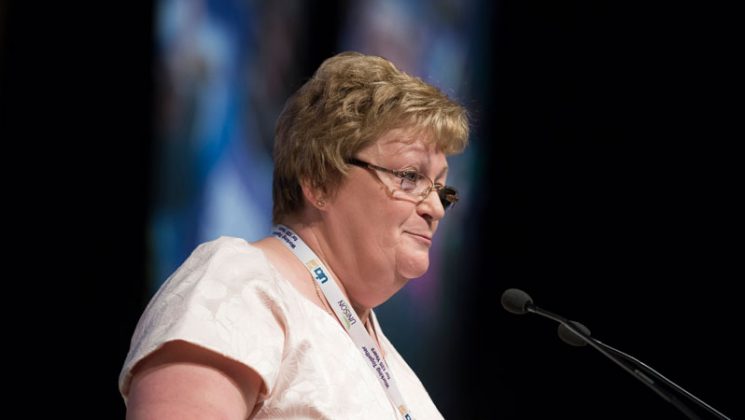Growing up in Armagh during The Troubles was not a time for lofty ambitions. You left school, you got a job. And that’s how it was for Lucia McKeever. But then, with encouragement from her trade union, her horizons started to widen considerably.
Lucia rose through the ranks of first COHSE, then UNISON, before serving as UNISON president from 2014 to 2015 – the first Northern Irish member to hold that office.
Now, as she prepares to step down from the union’s national executive council (NEC), she wants to encourage others to take the same journey.
“I left school at 16. I hadn’t even a spirit level, never mind an O level,” she says, amazed at how far she’s come.
It was May 1978 when she started work in the local hospital as a nursing assistant, not having the qualifications to train as a nurse.
She joined COHSE, one of UNISON’s predecessor unions and became a mailing steward, helping to put up posters, but not representing members. Then her friend and branch secretary, the late Cindy Fogerty, talked her into signing up for a weekend event for stewards.
“It was for a course, Women Work in Society. When we got there I was nearly physically sick at the thought of trying to study.”
In fact, by that time, married with four children, Lucia recalls hearing her kids say to one another, “Don’t ask Mummy about that – she can’t spell!” What she didn’t realise was that she was dyslexic.
One of the tutors persuaded her to stay for that formative weekend. And she was quickly hooked, moving on to Return to Learn, before taking the Care 100 course – a foundation course for nursing and social work.
Finding the confidence to speak
Education is vital, she stresses. And the fact that UNISON provided the courses – or, in the case of Care 100, worked with the Open University to provide it – and paid for them, was every bit as important. In her case, Lucia would never have been able to afford to pay fees herself, on a nursing assistant’s wage.
“I’ve always been gobby,” she says, “but [the courses] helped me to channel things better. I actually became a steward within the branch and then ended up us as branch chair.”
She cites as an influence the Northern Ireland regional education officer at the time, “a big fella called Paul Donachie, who was really passionate about education, about women developing – a fantastic fella. It was through him that I started, and then [former UNISON head of nursing] Gail Adams.”
There were more courses, which were not long and not arduous. Her dyslexia was spotted by a tutor who suggested she get tested. When the written diagnosis arrived, “I cried my eyes out”. Having struggled at school, where she’d been on the brink of what was then called the ‘remedial class’, being diagnosed as dyslexic was a formal confirmation that she wasn’t ‘stupid’.

UNISON leaders in the making: Lucia (front) with another future president from Northern Ireland, Margaret McKee, campaigning in 2012
She says that the courses “gave me the confidence to speak up to management and for colleagues at work.”
After becoming branch chair she joined the healthcare assistants’ committee, then the union’s national nursing committee – her first experience of working nationally – and then the health service group. Finally, she let herself be persuaded to stand for the NEC itself. “And I absolutely love it”.
Of her committee work, Lucia says: “I appreciated the fact that you are with like-minded people, who understand what you are talking about and may have ideas that could be of benefit to your branch and/or region.
“It’s also good to have a new set of eyes looking at a problem or issue.”
Her time on the health service group committee included the notable challenge of Agenda for Change.
The sky’s the limit
But for Lucia, the highlight of her UNISON career was when her NEC colleagues “entrusted me” to join the presidential team. “To know that I was valued and respected enough to hold such a high office in the union will always be special to me.”
If you’d suggested 20 years ago that she would become president, she says she’d have laughed and told you, “Ah, get yourself on!”
It’s a journey she recommends. “It takes a while to get used to working nationally,” she admits. Her advice is not only to rely on other committee members, but to work with the union’s staff too.
“To me, sometimes the staff don’t get the recognition they deserve. They play a big part in [members] developing their confidence as well. I’ve always found them very friendly and very approachable.”
She adds: “If a member is inclusive with staff, if they’re inclusive with all their comrades and partners on committees, they will thrive.”
Her future plans include spending quality time with her family – “long-suffering” husband John is now retired and they have grandchildren. And she fancies taking a dressmaking course.
She might get involved with the retired members and she certainly won’t stop thinking about politics.
“The arguments back and forth – I find that fascinating,” she says. “Coming from Northern Ireland, you develop that affinity with human rights, civil rights – it becomes an integral part of you.
“UNISON helped me politically. I would have had my own ideas, but never been able to articulate them.”
And she urges her fellow members to avail themselves of the same opportunities.
“Get involved with UNISON. If you want it and you work for it, the sky’s the limit.”

